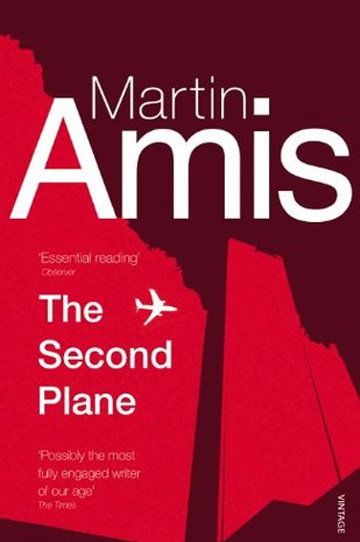
The Second Plane
April 24, 2008 | San Francisco Chronicle
One of the cleverer conceits of “Money: A Suicide Note,” which is perhaps Martin Amis’ best novel, is the introduction without fanfare of the character Martin Amis on Page 85. (Sir Kingsley Amis, the author’s late father, is said to have thrown the book across the room at that point.) Clever because “Money’s” narrator, one John Self, is despicable. The Amis character serves several purposes in the narrative, but one of them is to remind readers that Martin Amis is not John Self: He’s just a writer who worked up a nasty fiction. Without Amis the character, one could hate Amis the author by the book’s end.
For obvious reasons, no such trick is possible in Amis’ nonfiction, of which the latest is “The Second Plane: September 11: Terror and Boredom.” In his native England, Amis enjoys (suffers?) literary celebrity status, so he has the capacity to shock a lot of people. And given that he is one of the most savage, ferociously cynical and breathtakingly gifted prose stylists of our time, when he turns his attention to 9/11, he is bound to shock.
Many Britons are now calling for his head, though Amis’ 9/11 writings really aren’t that shocking. To use his phrase, his positions are “almost tediously centrist,” which makes the outrage coming from the far left of British and American literary circles a sign of politics whose priorities are badly out of order. He opposed the Iraq war, is baffled by the West’s recent turn to torture, despises George W. Bush and kind of admires Tony Blair. All solid positions. But he also deplores militant Islamic fanaticism, which he calls Islamism: “[W]e respect Islam – the donor of countless benefits to mankind, and the possessor of a thrilling history. But Islamism? No, we can hardly be asked to respect a creedal wave that calls for our own elimination.”
Amis also begrudges extreme Islamism because “it is racist, misogynist, homophobic, totalitarian, inquisitorial, imperialist, and genocidal.” And he rejects the proposition that the proper response to Islamist terrorism is guilty soul-searching for ways the West may have brought calumny upon itself – even granting that its foreign policies have played some part. The rational response, in Amis’ words, “would be something like an unvarying factory siren of unanimous disgust.” After all, Osama bin Laden is not asking the United States to adopt a more neutral position toward Israel and its neighbors; he wants to see all Jews (and all Americans, for that matter) dead.
In July 2005 – the month in which al Qaeda bombs killed 52 Londoners – Amis spent half an hour at an airport watching security officers search the knapsack of his 6-year-old daughter. He later wrote, “I wanted to say something like … ‘[S]tick, for now, to young men who look like they’re from the Middle East.’ ” This ugliness makes one wince, but only the most self-righteous moralist can claim never to have entertained a similar thought in the raw days after a terrorist attack.
What’s more, the fact that Amis thought this, and shared that thought in print, adds value to our public discourse and certainly does not make him some sort of racist. Most of the time, our national conversation is confined to screeds from true bigots and nativists on the right, screams from apologists for fascism on the left, and antiseptic bromides from our politicians. A wounded outburst – even an improvident one – is at least real, and it is common enough to warrant serious consideration rather than the thoughtless sounding of the PC siren.
Amis was much abused several years ago for taking on Soviet communism. His critics argued that he is not an expert in Russian history, and many will respond the same way to “The Second Plane.” But this is to almost willfully miss the point. Amis’ subject was never geopolitics; he isn’t offering foreign policy solutions or a way out of Iraq. His scope is both narrower and broader than that. He seeks to grapple with the paucity of reason, humanity and courage in the minds of men who would embrace nihilism, who would target children, who would trade in the currency of suicide mass murder. This is the novelist’s province as much as it is anyone’s.
Like other writers, Amis asked himself in the wake of 9/11 whether his occupation had lost its purpose. “The Second Plane” shows it has not, with a number of startling aesthetic contributions to our understanding of terrorism, especially this one, which was written on Sept. 18, 2001:
“It was the advent of the second plane, sharking in low over the Statue of Liberty: that was the defining moment. … That second plane looked eagerly alive, and galvanized with malice, and wholly alien. For the thousands in the South Tower, the second plane meant the end of everything. For us, its glint was the worldflash of a coming future.”